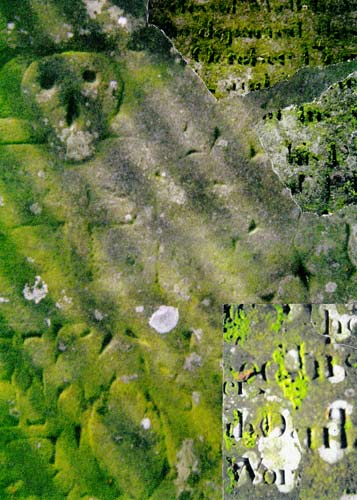
|
|||||||||||||||||||||
|
Geraldine Monk
This is an incomplete mapping of my poetry with places where I have lived that have become infused in my writing. I call it my 'emotional geography of place’. Not that all my writing concerns place nor have I included places merely visited. This is an alternative mini-biobib of key outscapes and interiors. I wrote elsewhere that 'I want the physicality of words to hook around the lurking ghosts and drag them from their petrified corners’. Those ghosts and corners exist in the real concrete world and the more you know a place the more you can hook its ghosts and corners. Apart from a brief reference to my parents there are no people in this biography except for this photo of me and my very old friend who lives deeply hidden behind a deeply hidden village church in Rutland.
She appears in my text Manufractured Moon. The whole text, which is not about Rutland nor my friend, can be found in Noctivagations or in the first Ahadada Reader.
Accidental Mystory My first encounter with place gradually dawned from August 1952 in Blackburn, Lancashire: that dour and dismal post-war decade of interminable Sundays and outdoor lavatories. Blackburn was a rain-sodden-smoke-ridden mill town surrounded by low-lush green-sodden countryside and prickly fells. There were dark days and bright days; days by the River Ribble or the Fylde coast. Many bright moments. Many dark.
I lived in an end-terraced house with a scary cellar and even more scary attic - its door was opposite my bedroom. I spent a great deal of my childhood scared out of my wits; what or who was under my bed? At the black-back of the coal cellar? Behind the curtains.
I now live in a flat. And there were the cotton mills. The hooters and clacking clogs or tired-out soles on the cobbles. I would sometimes be panicked from sleep by the mill siren and running feet. I thought it was an air raid and would wait for bombs to fall. I was born in 1952! I never knew WW2. I didn’t realise wars were ‘declared’ - I thought they just happened at any moment for no reason. Which of course they often do. This excerpt is from the poem ‘Sirens’ from my 1980 publication Spreading The Cards. shaking fantasy worlds sirens boiled from mills air raids dazed the holy ghost’s atomic tongues
Compounding all my heebie-jeebies was the fact that I was also brought up as a Roman Catholic. Brought up with a parallel world of saints, angels, martyrs, the Holy Ghost and the Blessed Virgin Mary. No wonder I was so easily spooked. The ‘other world’ was a reality from birth. My Guardian Angel fighting it out with Mr Bogey-Bloke under my bed. Much of my early writing was letting out this great gasp of stored-up childhood fears collected in Blackburn although it still gets into my work.
fluvium espial (excerpt) performed by Geraldine Monk, martin Archer and Julie Tippetts
*Choose Win if you use Windows Media Player or Real if you use Real Audio Player
Escafeld Hangings Mary Through the Looking Glass (excerpts) performed by Geraldine Monk
*Choose Win if you use Windows Media Player or Real if you use Real Audio Player
Place in Voice As Blackburn and Lancashire were my only known universe everyone except the voices coming out of the radio spoke with sumptuous diphthong vowels and severe guttural ‘r’s’. Generally speaking women spoke more slowly and deliberately than men because they spent their days word-miming and lip-reading in the deaf-out of the weaving sheds. It meant there were two types of Lancashire accent co-existing under the same roof: one a slow exaggerated enunciation, the other much faster and elliptical: Therre. Is. Trub. Bull. At. The. Milll. or Thstrouble ut’ mil.
My mother was fond of reciting Harold Munro’s ‘Overheard on a Saltmarsh’ in the slower more melodramatic variety of Lancastrian. My father talked faster, never recited but was never lost for words. I was in-between. As children are. Both forms creep into my writing. Here is an excerpt from the monologue ‘Katherine Hewit Replies’ from Interregnum. E was nowt budda Jimmy-bum-licker. E lived down’t lane in a big owse wi iz porky fatted fingers drippin rings and blottin copy after nervous copy -
Between the gentle rolling hills of Blackburn and its arch-rival Burnley lies the magnetic centre of East Lancashire: Pendle Hill.
I had already written a brief sequence of poems delving into Lancashire which appeared in Spreading the Cards. I was to develop that sequence into something more substantial when I moved to Sheffield. With Interregnum I was taking on all aspects of a geographic location. Its topography, historical occurrence, religious dynamics, present-day hauntings and my own autobiographical psycho-tectonics.
The Pendle Witches are the lynchpin. Why did 12 desperately poor and uneducated people from a remote hillside in Lancashire end up being hanged in Lancaster in 1612?
They may have had their prayers, spells and incantations but they didn’t have the all important ‘language-magic’ to conjure their way out of the legal system. Several generations later thousands of mill workers wouldn’t have the ‘language-magic’ provided by education to escape from the mills. Here
The City of Dreadful Night Around the age of 18 I left cosy Lancashire for cosy Huddersfield and then for the city of Leeds. Leeds would colour my view of cities for years to come. It was a dark, forbidding view. Leeds was a bruiser of a city.
The superb art college, public library, parks and shops drowned under the undercurrent of ever-present violence.
If they move on a half-lit city street - what can scare us more than a pair of dropped white gloves?
from 'Echo Visions’.
The beautiful white cat smothered in a plastic bag and thrown down a ginnel. The blood stained pavements. The maniacal and grasping landlords with their criminally unsafe and unsanitary properties. Sorry Leeds. I rather like you now. But then. Waiting for the locust dreams to descend Midnight diminished to a pulse a sliding oyster And brought you some kind of hell so silently The bucketful of harm glides in on the victim
'Invasion’ from the book Invasion.
Splendid Isolation In 1974 I moved to Staithes
As a born Townie and city dweller the contrast was electric. Traumatic. A remote farmhouse between the North Yorkshire Moors and the North Sea. I encountered a whole different species of spooks. The blackness of the night. Visibility of stars. UFOs. Unsheltered weather. Unsheltered smells. Never-before-seen birds and beasts. Stinking fungi. Rare flowers. A temperamental sea. I became a fervent nature lover. Eyeball to Owl Pellet. Survival of the least spooked. In the city you crossed the road to escape danger. In the country there were no roads to cross. Most of my earlier pamphlets and chapbooks books were written in Staithes. I had time and space to mentally breathe. The town and city lingered in my system for a while but gradually it got out and this alien landscape and culture came to roost in its stead. Sequences like Rotations, many poems in Spreading the Cards, Sky Scrapers and most of all Long Wake would not have been written at all as they drew so heavily on this specific location. Lyke Wake - The Coming of the Snow
Bury my heart Upon the night Upon the night settling like a death moth white knots drift and fleet and candle light on
Fire Tower
from Long Wake
The cultural upheaval of this prolonged stay in our understated, underestimated drop-dead gorgeous countryside was a profound assault on my body, soul and psyche. I could not but write. I wrote and wrote.
South In 1978 I spent the longest period of my life outside the north of England. I lived in Sussex for 6 months. The dreamy gentle beauty of the hills, thatched cottages and lapping waters of the bay were in stark contrast to the outwardly hostile natives. In this short space of time I began to yearn for the more rugged landscape, humour and warmth of my beloved north. My short sequence ‘Latitudes’ in my Selected Poems is mulling loudly over my ambivalence towards both north and south.
South
The soured milk and melt of ju-jubes sluice the jaundiced mind along to cool shades of yesterday.
Green nostalgia.
You down hills really roll. Smooth. Nubile bottoms up and falling. Tipsy. Your green youth and elders crawl and gang with prejudice. From music to misfits. From A to Z.
Serenade.
Gridded teeth map out. No entry. Go home. Keep Weeping. Keep walking that mincing step right up their street for a short cut. All narrowness. All fear.
Green Sleeves.
North
On this side. A divide and cast of vowels made to swear to shadow the most gentle words. Even love is flung gathering in the throat’s pit a stomach’s empty growl.
(Don’t luv’ me cock)
The spirit roosters call and spread throughout the night. Scratching dawn - morning hardly breaks. It ups and slithers.
The cock s spent up.
The hen s well b oiled.
Egg.
The Biggest Village In England After ten years of ‘splendid isolation’ in Staithes it was time to move back to ‘civilization’. In 1984 I moved to Sheffield aka ‘The Biggest Village in England’. It has been my home ever since. Thank you Sheffield. This was city not as malign, headachy fluence and violent undercurrents but city as a vital, exciting interaction and flux of people and place. The dynamic juxtaposition of centuries of architecture. The place names. The pubs. The art galleries and concerts. The sheer fun and fizz of living in a two university town. And with the Peak District minutes away. Ah! Those recollections with their reflections. Not in tranquillity but excitement. I started work on Interregnum. The irony of writing such a huge homage to Lancashire when living in Yorkshire would be lost in Sussex or Saffron Walden. But now in my 21st year of living in Sheffield, Escafeld Hangings is ready for the world. Escafeld is an old name for Sheffield and like Interregnum I write about Sheffield in general and Mary Queen of Scots in particular. Mary Queen of Scots who was imprisoned in Sheffield for 14 years. It is place as twilight zone. A recurring recurrence. I’m in there of course. In my Shed. We’re all there.
excerpts from
excerpts from |
|||||||||||||||||||||
| Login |



